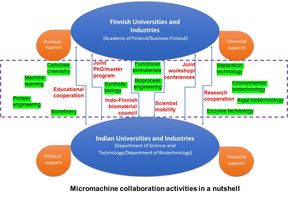MicroMachine to develop novel biomaterials through Indo-Finnish collaboration

MicroMachine platform proposes an approach to utilize nanocellulose produced by bacteria-called bacterial cellulose (BC)–to modify the product “during its biosynthesis”. The platform is being developed by Professor Sandip Bankar, from the Department of Bioproducts and Biosystems at Aalto University along with Professor Amit Bhatnagar, from the School of Engineering Science at LUT University.
MicroMachine platform brings together Aalto University, LUT, University of Eastern Finland (UEF), and Stora Enso from Finland and Indian Institutes of Technology (IITs) Kharagpur, Roorkee, and BHU from India. The platform will host a scientific discussion platform, workshops, seminars, visiting scholars, joint exchange and dual degree programs. The research platform collaborates for the development of feasible and environmentally friendly resource utilization approaches that can further the research and innovation capacity between Finland and India.
The research platform will elaborate cellulose modification inside bacteria as a bioprinter for producing functional sheets or complex 3D structures with tuned surface chemistry. According to Professor Bankar*, “Nanocellulose is a biologically derived nanomaterial that holds promise in diverse applications such as biodegradable nanocomposites, water treatment, and energy/green-chemical platforms. As the tools for modification are often environmentally hazardous and not scalable, MicroMachine proposes an approach to utilize nanocellulose produced by bacterial cellulose to modify the product ‘during its biosynthesis’ and reduce the harsh chemical usage and secondary waste generation”. In the view of Professor Bhatnagar “this collaborative project is timely and will provide new insights which could be beneficial in the context of bioeconomy, both in India and Finland.”
*Due to Professor Bankar's move to a new position, MicroMachine is now headed by Professors Eero Kontturi and Marjatta Louhi-Kultanen from the Department of Bioproducts and Biosystems at Aalto University.
MicroMachine is seed-funded as part of the India Pilot initiative from the Finnish Ministry of Education and Culture. Aalto is coordinating the India Pilot Network FICORE (Finnish Indian Consortia for Research and Education) which involves 38 higher education institutions from Finland and India.
